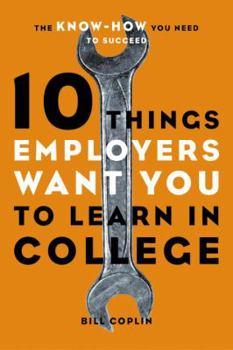10 Things Employers Want You to Learn in College: The Know-How You Need to Succeed
You'll learn a lot of things in college, but there's one thing the textbooks won't teach you: how to acquire marketable job skills before you graduate.Award-winning college professor and student... This description may be from another edition of this product.
Format:Paperback
Language:English
ISBN:1580085245
ISBN13:9781580085243
Release Date:August 2003
Publisher:Ten Speed Press
Length:272 Pages
Weight:0.85 lbs.
Dimensions:0.7" x 6.1" x 9.1"
Age Range:14 to 17 years
Grade Range:Grades 9 to 12
Customer Reviews
5 ratings
Gift Book for HS Graduates
Published by Thriftbooks.com User , 15 years ago
I recorded this book for RFB & D (blind and dyslexic and liked it so much that I sent it as a gift to several friends as a High School graduation present. The response from parents and teens was enthusiastic. I will order more.
HEADS- UP; GETTING THE JOB!!!!!!
Published by Thriftbooks.com User , 17 years ago
Want your children to succeed in the job market? Want to upgrade your own skills? This book offers much needed data about the value of work ethics, communication both verbal and written, working with others, influencing others, internships, building relationships. It is a job research primer. It also tackles the negatives of "helicopter parents" whose well-meaning attempts are often counterproductive to the individual learning process of the young adult trying to grow up and develop skills needed in the work force. Author Bill Coplin also explores time and money management, the interview process, identifying problems and developing solutions. A timely and well-written perspective.
Developing the Complete Package
Published by Thriftbooks.com User , 17 years ago
The book points out that college students need to develop real-world know-how in ten crucial skill groups: Work Ethic Physical Performance Speaking Writing Teamwork Influencing People Research Number Crunching Critical Thinking Problem Solving A degree might get your foot in the door, but having these skills will make you a valuable employee. I agree with the author that if a work ethic is missing, then all the other knowledge and skills are wasted.
Apractical guide to being practical with your education
Published by Thriftbooks.com User , 20 years ago
The book is a tremendous aid to help a college student, or for that matter any young man our woman get a leg up as they prepare for the real world they face outside of formal education. It addresses things that our formal education system misses. If you plan on working in a career, like most people, then you need this book to help you be prepared to face reallity of the work world. It suggests an investment of thought, time and energy but the payoffs will be worth it. Ask the HR people in your company if it is on target. My children will be reading it as they prepare to move into the "real world". Yours should too!
Good and bad
Published by Thriftbooks.com User , 20 years ago
The description of this title does not exactly make clear what the book is about.Part I - Know How GroupsDetails specific skills in 10 groups by saying 1) why they're important 2) how college-level coursework can help you develop them, and 3) how activities, jobs, and internships can help you develop them.Part II - What you should be doing in college to help yourself get a job/internshipExplains the idea of an apprenticeship, how to make college choices, volunteering, thinking BEYOND college, and morePart III - Planning your successMore on careers, improving your "know how" skills, and how to use show off your know how skills in your resume and cover letterPart I I found useful for some skills and a lot of fluff for others.The explanation of the skill itself is mostly useless and consists principally of 1) a discussion of a rather irrelevant quote put at the top of each section, 2) how you might use it in a business/management type position. Of course that helps you out if you enjoy irrelevant quotations and are heading for a career in management, but be warned - this book was written for liberal arts majors. That is the type of student this author has had the most experience with and portrays most skills that are necessary for a position in sales, management, or some other business-oriented capacity. It's not for engineering majors.Parts II and III I found very useful and eye-opening was the discussion of internships, jobs, and other activities outside of campus that comes after Coplin's foray into "know how groups." It details how you can use your connections and campus/online resources to find a career-starting experience at a relevant company. It also sheds some light on the internship experience and why it's important to "pay your dues."If 1) you're majoring in some liberal arts field, or 2) want to learn more about what you SHOULD be doing with your time in college, this book is for you. But don't pick it up if you want to go to med, law, or some other graduate school. There are simply better titles for guiding you to those areas.





